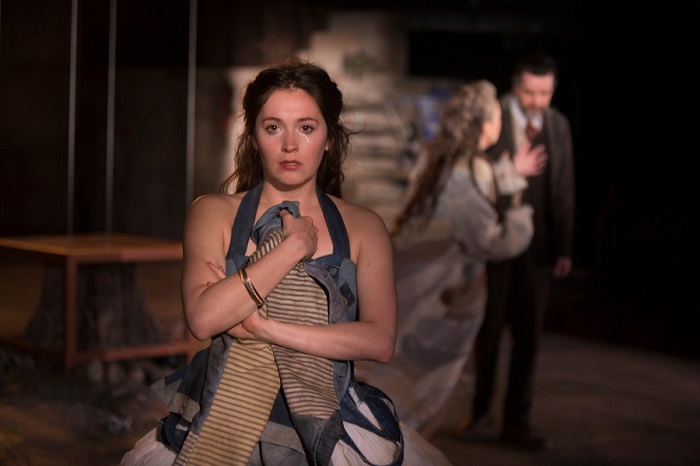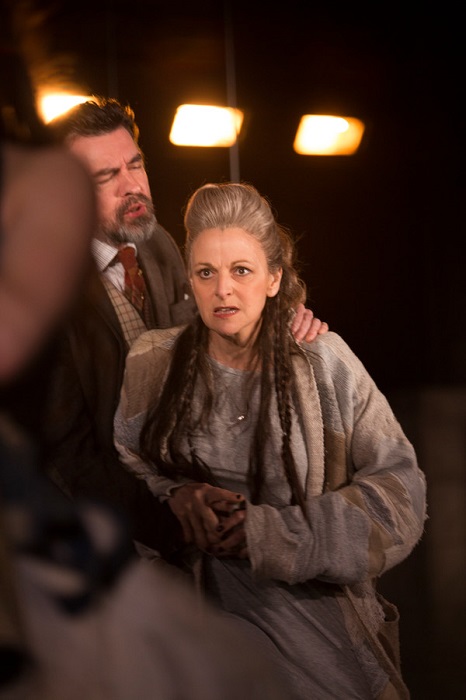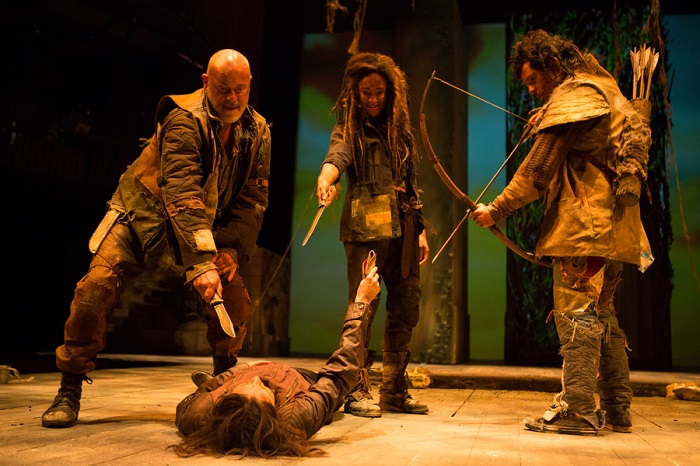photo by Ellie Kurttz
For reasons I don’t pretend to understand 2016 has been the year of Cymbeline, a production of the play formed part of the winter season at the Globe’s Sam Wanamaker playhouse at the start of the year, Matthew Dunster’s “renamed and reclaimed” Imogen ended Emma Rice’s debut season in the Globe’s main space and Melly Still’s post-apocalyptic take on the play was the central thread for the summer season at the Royal Shakespeare Company too.
Newly transferred from Stratford to the cavernous space at the Barbican Centre, I’ll confess to being unsure how well audiences would take to a play that – on the page at least – is a complete mess with no discernible central plot. Thankfully Still and her team have largely kept the story flowing and, with the help of some inspired casting choices, enabled us to be drawn to characters that can all too often be unlikeable.
Photo by Ellie Kurttz
The audience enter to a loop of home video footage – two children playing while the parents, always on the edge of the frame watch and encourage them, as the house lights dim Gillian Bevan’s Cymbeline stalks the stage and we realise these are her children, long since lost. Gender switching the title character is a master-stroke, at once taking a role that all too easily becomes a thoughtless blow-hard and infusing Cymbeline’s decisions with maternal worry and doubt. You understand the pain of losing two children still haunts her and her protectiveness of Innogen makes much more sense.
Innogen (or Imogen – sources differ on which is the correct name, but we prefer the option the RSC have chosen to be honest) is the glue that holds the disparate stories together and a notoriously difficult role to flesh out. Bethan Cullinane seems the perfect choice. She gives us Innogen’s innocence in spades and when her heart is broken by her husband Posthumus’ banishment it’s all you can do not to jump out of your seat to give her a hug and fetch her a cup of tea – she visibly slumps with the violence of the news and carries the pain throughout every scene beautifully. When she flees to Milton Haven in the guise of a boy her whole persona subtly changes – it’s more than just taking off a wig and donning a pair of trousers.
Elsewhere there are strong performances from Marcus Griffiths as the vacuous Cloten – obsessed with marrying Innogen for her position he’s little more than a spoilt brat but Griffiths somehow makes you like him nonetheless. Oliver Johnstone revels in the smarmy, obsequious Iachimo who drives a wedge between Innogen and Posthumus that sets the second half of our story into action.
Image by Ellie Kurttz
Natalie Simpson delivers a standout performance as Guideria, from a beaming smile that lights up and warms the entire theatre to a prowling physicality as she battles Cloten, Simpson has an ability to draw the eye to whatever she’s doing that marks her as one to watch – we have a future star here!
Although there are still plot elements that don’t fully make sense and the whole still seems, at nearly three and a half hours, over-long this is a fine production of a normally problematic play and one well worth investing your time in!
Until 17th December, for more information head to rsc.org.uk





Comments
Post a Comment